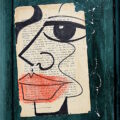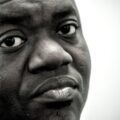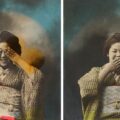Conversations: Laura Ellen Scott and Amber Sparks
Amber Sparks and Laura Ellen Scott are two fiction writers with powerful, parallel voices. The two corresponded throughout May, bridging the distance with a discussion of the performative side of writing a character’s voice and the transformation of styles as they push from project to project and genre to genre. Uncovering new worlds in plot and writing, Sparks and Scott dive into a brilliant liminal space between literary fields.
—Alison Lanier
Laura Ellen Scott: I was just gathering all my “Amber stuff” together, and I realize that the body of your work reminds me of William Golding, and I really want to pick your brains about surety and facility of voice in ancient / antique / fantastic contexts. That is, your narrators are authentic but rarely mannered, even though they are certainly passionate. Am I wrong to assume “performance” is part of your process?
I’m also struggling to form a non-idiotic question about the dramatic appeal of imaginary catalogues (mumble, mumble, something about recreating tiny thrills of discovery, etc.). That one isn’t coming together very easily.

Amber Sparks
Amber Sparks: So, that’s wonderful that you think of William Golding when you think of me, because he’s fantastic. And that’s a question that I think you deal with a lot, too, no? I struggle with voice when writing, in historical contexts especially, because I have what I think is a fairly distinct style and a voice that I don’t like to submerge under some kind of mannered voice—whether it’s a kid or a cowboy or an alien or whatever, it’s absolutely performative in that the voice is going to sound a lot like mine, with a difference. It feels maybe like wearing a mask over my face, but more of a masquerade mask than a real full-face Halloween mask. The kind that’s more of a wink and nod than an actual disguise.
There are some writers who are so good at creating new voices—I am not one of them. So I think performance is a really great word for it. What about you? I sense you have some similar problems, being the owner of a fairly distinctive voice yourself.
LES: I’m a fair mimic, and most of the time it’s unintentional. When I hear / read an interesting phrase, the shape of it sticks with me. Reading Hawthorne as a sophomore was as influential to my writing then as binge-watching Hap and Leonard is now. I actually dropped the phrase “Oh my fuck” into the speech of a Gilded Age entrepreneur in The Juliet, which was something I’d never heard until Bubbles said it in Trailer Park Boys. So that’s fun, but I should be more careful. I get plenty of nineteenth century comparisons, too. Just the other day someone referred me as a “stoner Dickens,” a compliment that is as likely to drive away as many readers as it attracts.
Possibly one of the reasons I don’t write as much very short fiction anymore is because I’ve become aware of when I slip into that mystified, paranoid voice, which has become one of the tropes of flash; it doesn’t feel like I own it, so much as the voice belongs to our community of writers.
These days I want the anxiety of voice to be anchored to something particular, and more often than not, that particularity is a conventional “artifact,” which I suppose inclines gothic, as well. What’s the drama in curios and catalogues—I’m specifically referring to the novella, now. Your novella, of course, but now that I come to think of it, we can see this urge in other novellas, too…
AS: I like the idea of anchoring to an artifact, of course—and I’m not sure if it comes from wandering around museums wondering about the stories behind everything, or reading about objects and wondering about the museums that would contain them. Probably a little bit of both, I think.
I wish we had known one another five or so years ago. I did this project for Necessary Fiction where I gave some writers I knew an object and had them write about it—but there were constraints specific to a particular fictional archeological project. It was great fun. Of course that sort of one-off project builds itself, but the larger problem is how to build on that without it becoming tedious. (Thus, probably why it’s better suited to novella than novel.) My novella was originally a novel, and the tedium that the cabinet and photos snapshots eventually become was terrible. Yet another good reason the novel become a novella.
What about flash, speaking of flash? How different was it for you, moving from primarily flash into what’s a pretty long novel? I ask in part because I’ve had enormous troubles myself navigating the switch.

Laura Ellen Scott
LES: Well, we’re both fresh from helping out with the Wigleaf Top 50 and Longlist this year, so my perspective is probably skewed, but I’m beginning to think that flash writers obsess over form more than other fiction writers. We love flash, most of us are self-trained, and if lit conference programs are to be believed, we spend a lot of time explaining flash.
That said, I do very few flash stand alones these days—seriously, maybe only one or two a year—but when they work they have my heart. And yes, transitioning into longer work sometimes feels unfaithful.
However, I think that going from flash to novels is a more natural leap than going from short stories to novels. Flash translates into scene quite well, but short story technique is too self-interrogating and gums up momentum. I know a lot of short story writers who get to page 100 and drown. The abandon of flash sensibility allows me to dance past that and embrace the sprawling, organics of novel development—as opposed to worrying about it.
With my first novel, Death Wishing, I extracted flashes as I went along, and that was wonderful because doing so kept my spirits up. Flash was my Yoko Ono. But with the next two novels, The Juliet and The Mean Bone in Her Body, I’ve grown more comfortable with the process. I’m lucky that my imagination is stronger and better organized than I realized. Thank you, American Modernism module in sophomore lit. Thank you, Scrivener.
So the baby elephant in the room is The Unfinished World, a collection that places obvious priority on the longest work in it, a novella that is beautiful and has the scope of a novel, but the voice is so self aware—again, back to that—it seems to belong distinctly to the shorter forms, as it’s sort of breathlessly intimate but also dreamy and expositional, like Duras. Her novels were very short and dependent on repetition. Why do you want to write a novel?
AS: I’m going to pick out this thing you said and run with it because I’m so intrigued: “I think that going from flash to novels is a more natural leap than going from short stories to novels. Flash translates into scene quite well, but short story technique is too self-interrogating and gums up momentum.”
I find that to be so true, but I know that one criticism I got from editors (and fellow writers) on my previous novel efforts was that there need to be more long scenes, that there’s too much flash in the novel—it’s jarring or too abrupt, doesn’t flow. And I sort of agree? Actually, my editor and I had that conversation about the above-mentioned novella and agreed that the snapshot method was a bit too much for a lengthy novel but worked very well in the novella. And I think about the novels written this way—Michael Kimball comes to mind, or David Markson or Carole Maso—and most of those novels are fairly short. But those tend to be almost mannered snapshots, quite short and abrupt, and I’d say you’ve found your way to the kind of hybrid that I’m trying to get to.
Ha, and I don’t really want to write a novel at all, other than to prove to myself that I can. I’m not sure I’ve ever done anything for any other reason, and I don’t know what on earth that says about me. I probably don’t want to know. (I do love the comparison to Duras and I hope that I can write more like her—that’s a perfect example of the type of thing I’m always working toward.)
What about genre? We both went from flash, which really allows a tremendous freedom in transcending genre, I think—because the form (as you say) is the thing, not the subject matter. And then once you get into a longer book it’s suddenly genre that you’re doing, even when you’ve been writing about the same damn things all along. I love that I can write a short story now that’s a western, another that’s straight-up sci-fi. And yet, you’ve written The Juliet—have you gotten the genre questions/categorization yet? Do you worry about being pigeon-holed, or not so much since you obviously have not settled into any one “genre.”
LES: I hope this isn’t disappointing, but I’m happily cartwheeling into genre—specifically mystery, and the first book in a three-book series called The New Royal Mysteries should be out by the end of the year. The series is set in a fictional college / prison town in Ohio, which is sort of a mash-up of Athens and Chillicothe. I love mysteries, the darker the better, so I think I’ve always been headed in this direction. The marvelous challenge of writing mysteries is that I’m supposed to know what I’m doing. At the same time I have to remain open to intuitive, discovery-driven writing if I’m going to create art that works.
I’m very aware that my genre choices—suspense, mystery—are more privileged than others, promising much more violence than genres considered “women’s fiction,” which looks more and more like a way to carve women writers out of discussions of literary merit. This is something I’ve been grinding on lately.
However, I think genre labels like “speculative fiction” and “fabulism” have helped you find a wider audience, haven’t they?
ANS: Ooh, that sounds fantastic! I’ve actually been toying a lot with the idea of writing a mystery, a sort of weird version of a Hercule Poirot type thing. It just seems like a fun challenge.
You know, I’m not sure that my genre choices have helped find a wider readership—I don’t think that any or many of my readers are sci-fi or spec fiction fans really. I haven’t been reviewed in any genre publications or anything like that. And I’ve actually never published a story in one, either!
I’ve been thinking about this a lot lately, because I think back to when I was really mostly fantasy and sci fi and was always so hungry for a really literary version of the genre. I feel like I could develop a wider readership and just haven’t done much about it, and would like to change that. Start submitting to Orion or Clarkesworld, that kind of thing. I think I avoided that stuff while I was still trying to get published in literary mags because back then, it looked bad to have genre publication credits. Now of course I’d be thrilled!
LES: Right—and online publishing was stigmatized as well. I think mystery would be very natural for you; it’s a great place to store objects of intrigue.
I realized I forgot to mention that I did have a genre anxiety dream the other day. I dreamed I was at the Anthony Awards and I was removed from the priority seating for nominees and asked to go sit in the back with a bunch of strange women in white cotton dresses and headbands.
When I woke up, I realized they were the “Sisters In Crime,” which is a real-life networking organization for women crime writers that I just joined.
ANS: I love this: “it’s a great place to store objects of intrigue.” I have this other fantasy of writing a novel populated by nothing but MacGuffins. I think Ellen Raskin did that amazingly well and I’ve always wanted to, too.
Do you think writing in different genre forms has taught you anything new about the process of writing, the craft?
LES: My whiteboard is three and a half feet wide now, so that’s different. Recently I sent a mystery story to Art Taylor to read, and he said that it needed “more foundation.” That same day I sent Erin Fitzgerald a flash, and she said, “remove some of the scaffolding.” A few years ago, Erin and I collaborated on a flash called “A Rubblestone Tower Mystery,” during a time when we were both power reading through a bunch of edgy British procedurals, books that are like holding a three day rain storm in your hands, and the story was a collection of detached tropes. Erin wrote the last line, which was a confession letter from prison:
“My dears, I regard loyalty as the tidiest crime of all. And I have kissed those innocent, without reservation.”
I mean, wtf? It’s brilliant, but impenetrable. For flash folk, only. Erin is oblique as hell. In “real” genre, your readers are there with questions, most of which you need to answer, or at least be able to. That foundation Art is talking about.
Erin is the only person I can imagine collaborating with, partly because we communicate imperfectly with one another, and things crack open. Would you do another collaboration like The Desert Places? I’m crazy about that book.
ANS: Man, that is great stuff. Erin is fantastically oblique which just slays me in the best sense. I have a feeling any mystery I write will be the same sort of thing—very much “mysteries for a weird sub genre of lit readers only.” Like Erin, I tend to the oblique (though not in quite that same brilliant way) so it would probably read almost more like fan fic to my own understanding of a genre’s tropes. I tend to hate the scaffolding. It’s one of the reasons I think it would be especially fun to write a mystery—doing it without the foundation. (And I should say I love the foundation in reading, like in Art’s wonderful stories, for example. Just not so much in my own writing.) One of my sins always is to write toward a sense of mystery—and writing a mystery with mystery sounds fun as hell.
I had great fun writing The Desert Places. Someday, I’d love to do something like that again. I think I learned a lot from the process about my own writing and about editing.
LES: How did that happen? Did you all agree on the concept explicitly?
ANS: Yes and no. We agreed on sort of the general concept and had agreed to let the rest just come. We each took separate chapters, too, though we edited each other’s chapters heavily so there would be little / no difference in writing and tone etc. You can kind of still tell in places if it’s Rob or me, but I think it would be pretty hard in most of the book, which I’m proud of. That’s why I learned so much, I think, about my own voice / quirks / darlings. It’s a weird thing for a writer to intentionally submerge their own voice, but I kind of loved that freedom, if you can call it that.
What did you like about collaboration? Have you done it before the project with Erin?
LES: It was very spur of the moment, really. I had these lines and notes that did dark little things but not together, and in a fit I just sent them to her and said, “do something with this,” and she just knew exactly where it was all coming from.
I think the reason it worked was because she didn’t even pause before diving right in. Also, I think we’re both the losers in any group project who actually do the work. As for prior collaborations, no. Erin was supposed to work with me, Andrea Kneeland, and Donora Hillard on a dark-themed flash collection to be illustrated like a graphic novel, but project was spearheaded by Cami Park, and she passed away just a few months into it. The work I completed for that project was developed into an online chapbook called Curio, with illustrations by Mike Meginnis. I suppose that was a kind of collaboration, but he was the publisher and editor, so not exactly.
ANS: Good lord, that project sounds amazing—Cami, Erin, Andrea, Donora and you? I loved Curio, too—that was such a fabulous project.
So speaking of projects (segues!) what are you working on now? What’s up next?
LES: This summer the plan is to draft the second book in the New Royal Mystery series. The working title is The Orphans Court. Also the edit phase—which at Pandamoon Publishing is intensive—should launch soon for the first book in the series, The Mean Bone In Her Body. Mean Bone is about an amoral professor put in charge of a mentally unstable grad student who writes about a local murder and becomes famous. Orphans Court is about uncovering the town of New Royal’s poorly documented, dark beginnings. There’s going to be a word game in the book, a huge puzzle that the whole town plays, thinking that it’s a kind of PR apology event hosted by the University, but it will turn out badly, of course. With the series I’m shooting for a feel that’s a Stephen Dobyns / Tana French blend. I’m really looking forward to figuring out how to reference the events of the first book in the second in a way that doesn’t sound like an eight year old telling you the plot of Inside Out.
To tag back to the genre question, I feel truly confident about the series, not just because I have a contract to produce them, but because going in, I know what they are, on the most basic level. That is, The Juliet became a suspense novel, but I didn’t know that at the outset. I was actually thinking it would be more like It’s a Mad, Mad, Mad, Mad World. I’m very happy with how it turned out, but it took a long time to write because it took a long time to discover its goals. In contrast, Mean Bone came quite quickly, and I’m not nearly stressed out enough that I need to get a draft done of Orphans Court this summer. The only sacrifice I’m making is I’m not going to download any new games.
It’s funny with this whole B. Mitchell Cator business popping up. One of the stories he published as his own was written by Cami.
ANS: I was incredibly bummed by this Cator business, in part because I was reminded what a talent (and human) we lost in Cami Park. Also because I tend to be hugely paranoid about drafts—I shred everything on paper—and not at all about published work, figuring I would know if I was plagiarized. Guess not!
Gosh your brain is a wonderland. It’s so weird in there—this is exactly why I wanted to converse with you. I love the idea of the word game within the book—that’s exactly the kind of thing I devour and covet in other writers’ writings.
LES: So what do you need from the world to help you with your goal of writing a novel? Or are you working on another collection?
ANS: Me, I’m working on stories, always, and yes, a novel too. I could answer “what do I need from the world” in all kinds of ways, including free child care and more payment for writing. But realistically? I need a lot of time and patience and hopefully some interest in a much more contemporary novel—and by contemporary I mean set in the 1970s. It’s kind of Wuthering Heights meets A Confederacy of Dunces, if that appeals to anyone but me.
LES: I’d read that in a heartbeat. What are you calling it, right now? Also, do you have a writing group? All of my friends who are working on novels have a group, except me.
ANS: I’m not calling it anything yet—I don’t usually title stuff until after it’s finished, so right now it’s “the novel,” ha. And nope, I do not. I’ve belonged to writing groups in the past but I’m always the asshole who doesn’t have time to look at anyone’s stuff so I stopped belonging. And with the baby right now, man, I’d be especially terrible. I never know if I’ll write anything at all in any given week or month. What’s your excuse re: writing group?
LES: Ha, well I teach writing workshops for a living, so there’s that. If I was in a group I’d probably want to run things, and I don’t need more admin in my life.
I give my drafts to my partner. His areas of expertise are poetry and science writing. He doesn’t like fiction, so that’s the bar I have to clear.
Amber Sparks is the author of the short story collection The Unfinished World and Other Stories, which has received praise from The New York Times, The Washington Post, and the Paris Review, among others. She is also the author of a previous short story collection, May We Shed These Human Bodies, as well as the co-author of a hybrid novella with Robert Kloss and illustrator Matt Kish, titled The Desert Places. She’s written numerous short stories and essays which have been featured in various publications and across the web – find them here at ambernoellesparks.com, and say hi on Twitter @ambernoelle.
Laura Ellen Scott is the author of the novels Death Wishing, The Juliet, and the New Royal Mysteries series, the first book of which is The Mean Bone in Her Body, due out in late 2016. Laura lives in Fairfax, Virginia and teaches creative writing at George Mason University.





